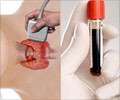People suffering from obstructive sleep apnea reported significant improvements following thyroidectomy.

Alexandra Reiher, MD, and colleagues from the University of Wisconsin, Madison, evaluated the impact of goiter on OSA by assessing OSA symptoms such as snoring before and after thyroidectomy to remove all or part of and enlarged thyroid gland. Patients who reported symptoms of OSA included snoring were asked to complete a questionnaire before and 8 weeks after undergoing thyroidectomy. Data presented today at the 81st Annual Meeting of the American Thyroid Association showed significantly fewer patients (51% versus 71%) were considered to be at high risk for OSA following surgical reduction or removal of the thyroid gland. Symptom scores improved substantially after thyroidectomy, including a significant decrease in snoring frequency and lower scores on the question of whether the snoring bothered others.
"Obstructive sleep apnea is obviously a complex problem with numerous causes, but we find it encouraging that thyroidectomy alone can provide significant improvements in nearly a third of patients, regardless of gland size," said study author Rebecca Sippel, MD, Assistant Professor, Division of General Surgery, and Chief, Section of Endocrine Surgery, at the University of Wisconsin School of Medicine and Public Health.
These results indicate that thyroidectomy to treat an enlarged thyroid appears to improve snoring symptoms associated with OSA. Based on these findings, the researchers suggest that evaluation of patients with obstructive sleep apnea include an assessment for goiter.
Source-Newswise















